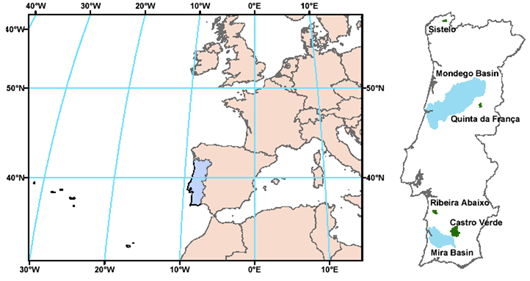Portugal
Project Summary

Figure 1. Portugal (mainland and islands) and the case
studies regions of the Portuguese sub-global assessment.
Portugal covers an area of c. 92 000 km2 and has an oceanic exclusive
economic zone of c. 1 700 000 km2. The country experiences high climatic
variation and has high diversity of ecosystems, many of which are confined
to small spaces and result in ecotones associated with high biodiversity.
Soil degradation as a result of water erosion presents a high risk of desertification
in Portugal, and Portuguese ecosystems and agriculture are particularly
vulnerable to climate change because of fire risk, water scarcity and the
number of species and habitats already threatened.
The Portugal Assessment (ptMA) was conducted as a country-wide assessment
focused on specific pilot projects at multiple spatial scales. The case
studies were not fully representative of the country, but were designed
to provide particular insight into ecosystem changes at each scale. Spatial
scales at which assessments were undertaken include: national, basin and
local. At the national scale, the assessment was organized according to
ecosystem (marine, coastal, inland water, Montado, forest, island and urban).
The pristine Mira basin estuary, in Alentejo and the intensively studied
Mondego estuary in Beira Litoraland were assessed for the basin scale. The
Mondego differs significantly from the Mira, in that it is under heavy human
influence. Assessments were also carried out at the local level in highly
variable regions throughout Portugal. These sites were chosen on the basis
of user needs, the existence of projects or research, and to cover multiple
regions.
Ecosystems services users were engaged in multiple aspects of the assessment
and had a primary role in choosing scales and case studies for assessment.
In order to maintain a close working relationship, users participated in
research meetings at all levels of the assessment. Users were active in
scenario- building and in the qualitative assessment of conditions and trends
of ecosystem services.
Users identified several areas of interest for assessment. Almost all
users were interested in the economic valuation of ecosystem services and
assessing the condition of these services. Equity of environmental benefits
and the history of land use were important areas of assessment for some
users, while others were especially interested in the effects of legislation.
In particular, users identified the impacts of CAP, NATURA 2000 and the
Nitrate Directive as legislation they would like to see assessed. Driving
forces of change (including climate change, consumer behaviour, species
introduction, fragmentation of habitats and urbanization) in the ability
of ecosystems to provide essential services were also of concern to users.
Forest and agricultural lands were listed by most users as priorities for
assessment.
Assessment Approach
The assessment was divided into multiple phases. Firstly, user needs
and response options were assessed. Next, scenario development and expert-based
assessment of conditions and trends were carried out. Finally, a stakeholder
(scientists, users, etc) reviewed publication process of the assessment
results produced three documents: State of the Assessment Report, Report
on User Needs and Response Options, and Portugal Assessment Book.
Human well-being was assessed at the local and national levels using
economic, social, and environmental indicators. Issues of equity were addressed
using income poverty indicators and disaggregating some indicators by location
and gender. In Sistelo, a participatory approach was used to determine well-being
at the local level.
Drivers of change in ecosystem services were assessed through workshops
with the research team and the users and through a literature review by
the scientific team.
Lead Institutions
The Center for Environmental Biology (CBA) of the Faculty of Sciences
of the University
of Lisbon was the coordinating institution for the ptMA the scientific
team was consisted of 40 scientists from over 10 universities, research
institutions and government agencies. The steering committee for the assessment
was composed of: Henrique M. Pereira, Tiago Domingos, and Luis Vicente.
The intended audience for the assessment is national and local decision-makers.
The board of users included ten members representing government agencies,
non-governmental organizations and the private sector. The advisory board
was composed of seven members, including scientists and decision-makers
and was chaired by Isabel Guerra of the Portuguese Ministry of Public Works,
Transportation and Housing.
Contact information
Primary funding for the ptMA was provided by the MA, Xaiza Geral de Depósitos,
and the University of Coimbra. In-kind contributions were also provided
by the home institutions of the researchers. Further financial and in-kind
support were received from: Faculdade de Ciências da Universidade de Lisboa,
Universidade Católica Portuguesa, Universidade Nova de Lisboa and Universidade
Técnica de Lisboa and Caminhos e Ferro, E.P..
Ecosystems Services Assessed
Provisioning services: water, food and fiber; regulating services: climate
regulation, soil protection and runoff regulation; cultural services: recreation,
education, ultural heritage and aesthetic value. Additionally, biodiversity
was assessed.
Project Outputs and Results
Users and the research team identified the following as the primary drivers
of change in ecosystem services in Portugal: fire regime, land tenure and
farm structure, economic growth, land used changes related to multiple factors,
tourism, introduction of exotic species, population distribution and migration,
environmental legislation and attitudes towards this legislation, CAP, and
international trade agreements.
Reports
Links